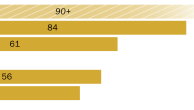Majority of Republicans say GOP should not be accepting of Republican officials who openly criticize Trump
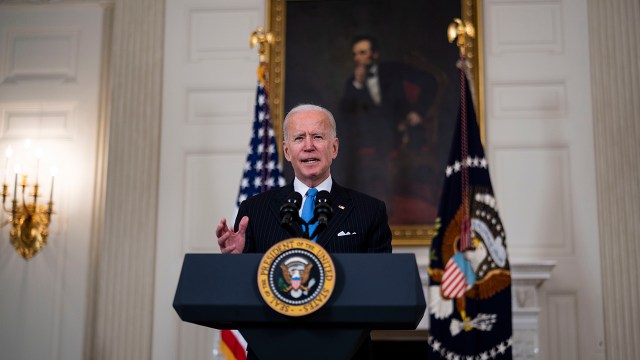
Pew Research Center conducted this study to understand the public’s views of Joe Biden and the Republican and Democratic parties. For this analysis, we surveyed 12,055 U.S. adults in March 2021. Everyone who took part in this survey is a member of the Center’s American Trends Panel (ATP), an online survey panel that is recruited through national, random sampling of residential addresses. This way nearly all U.S. adults have a chance of selection. The survey is weighted to be representative of the U.S. adult population by gender, race, ethnicity, partisan affiliation, education and other categories. Read more about the ATP’s methodology.
Here are the questions used for the report, along with responses, and its methodology.
A little less than two months into his presidency, Joe Biden has a positive job approval rating and draws confidence from majorities of the public on his ability to handle a range of issues, especially the coronavirus outbreak.
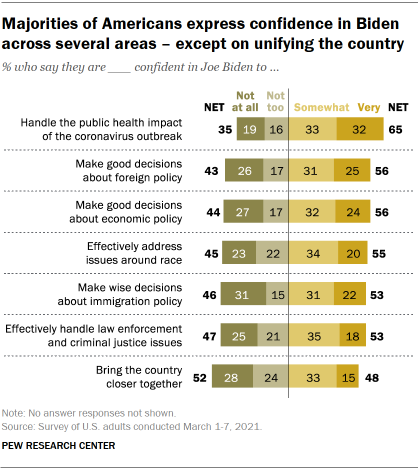
Nearly two-thirds of Americans (65%) say they are very or somewhat confident in Biden to handle the public health impact of the coronavirus outbreak. Narrower majorities express confidence in Biden for making good decisions on foreign policy and economic policy, effectively handling issues around race, making wise decisions about immigration policy and effectively handling law enforcement and criminal justice.
By contrast, about half of Americans (48%) have confidence in Biden to bring the country closer together, while slightly more (52%) have little or no confidence he can foster greater unity in the United States.
The new national survey by Pew Research Center, conducted on the Center’s nationally representative American Trends Panel March 1-7, 2021, among 12,055 adults, finds that 54% approve of Biden’s job performance, while 42% disapprove. Biden draws more strong approval (38%) than strong disapproval (29%).
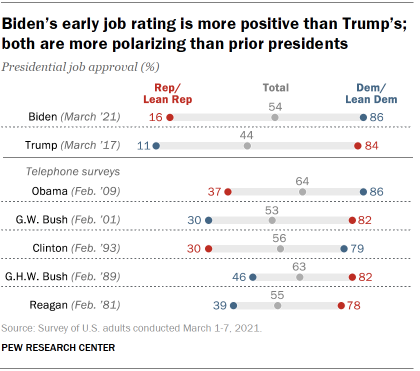
Biden’s job rating is higher than Donald Trump’s at a comparable point in his presidency in 2017 (44%) and lower than Barack Obama’s in February 2009 (64%); the 2009 survey and those for prior presidents were conducted by phone.
Both Biden’s and Trump’s job ratings are more divided along partisan lines than were their predecessors’. Biden draws support from 86% of Democrats and Democratic-leaning independents, which is similar to Trump’s approval among Republicans and Republican leaners four years ago (84%). Just 16% of Republicans and Republican-leaning independents approve of Biden’s job performance today; four years ago, Trump’s job rating was even lower (11%) among Democrats and Democratic leaners.
Previous presidents, dating back to Ronald Reagan, had job approval ratings of 30% or higher among members of the opposing party early in their presidencies.
While the public expresses a high level of confidence in Biden on the coronavirus, his early actions to deal with pandemic also have been viewed positively. Last month, 56% said the Biden administration’s plans and policies will make the country’s response to the coronavirus better. And in the latest survey, the administration’s coronavirus aid package is favored by 70% of Americans.
Biden also gets generally positive ratings for his personal traits and characteristics. Two-thirds of Americans (66%), including 36% of Republicans, say he stands up for what he believes in. Majorities view Biden as someone who cares about the needs of ordinary people (62%), a good role model (58%), honest (57%) and mentally sharp (54%).
The survey finds that the Democratic Party is viewed more favorably by the public than the GOP. While slightly more Americans have an unfavorable (51%) than favorable impression (47%) of the Democratic Party, 60% express an unfavorable opinion of the Republican Party, while 38% view it favorably.
A larger share of the public also says the Democratic Party respects the country’s democratic institutions (56%) than says this describes the Republican Party (48%) very or somewhat well. And while 50% say the Democratic Party governs in an honest and ethical way, fewer (41%) say that about the GOP.
However, nearly identical majorities say both parties are too extreme in their positions: 61% say that describes the Republican Party very or somewhat well, while 60% say the same of the Democratic Party.
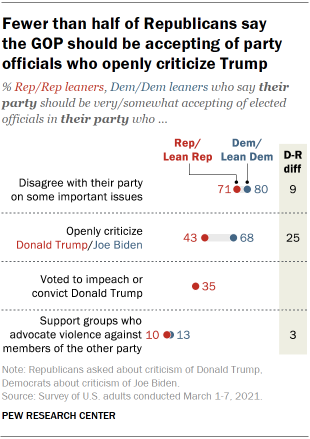
When Republicans and Democrats are asked about the acceptability of various actions and behaviors by their own party’s elected officials, 80% of Democrats and Democratic leaners say their party should be very or somewhat accepting of a Democratic official who disagrees with the party on some important issues. A narrower but still sizable majority of Republicans and GOP leaners (71%) say their party should be accepting of a Republican official who disagrees with the party on some key issues.
There are more striking differences in how partisans view criticism of their party’s top leaders – Biden and Trump. About two-thirds of Democrats (68%) say the Democratic Party should be accepting of Democrats who openly criticize Biden. Among Republicans, fewer than half (43%) say the GOP should be accepting of officials who openly criticize Trump; 56% say the party should be not too accepting or not at all accepting of such an official.
And those who identify as Republicans or lean toward the Republican Party are even less welcoming of Republican elected officials who voted to impeach Trump: Just 35% say the Republican Party should be very or somewhat accepting of officials who voted to impeach the former president. Among conservative Republicans, just 26% say the party should be accepting of Republican officials who supported Trump’s impeachment.
In both parties, there is little tolerance for elected officials who support groups who advocate violence against the opposing party: Just 13% of Democrats and 10% of Republicans say their party should be very or somewhat accepting of elected officials who back groups advocating violence against the opposing party. Overwhelming majorities say their parties should be not too or not at all accepting of such officials, with about seven-in-ten in both parties saying there should be no acceptance at allof this (71% of Republicans, 68% of Democrats).
The survey finds that while a majority of Americans are very or somewhat confident in Biden to make good decisions on economic policy, positive ratings of the nation’s economy have declined since November, shortly after the election. Currently, 23% rate national economic conditions as excellent or good, down from 36% in November.
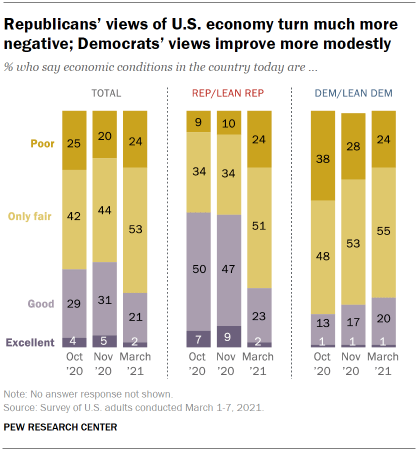
This largely reflects a substantial change among Republicans: Today, just a quarter rate economic conditions as excellent or good; in October, prior to the election, as well as in November, majorities of Republicans had favorable views of the economy (57% in October, 56% in November).
Over this period, Democrats have become only somewhat more positive in their assessments of the economy. The share of Democrats who rate economic conditions as excellent or good has edged up from 13% in October, to 19% in November, and 21% in the current survey. However, since October there has been a notable decline in the share of Democrats who say economic conditions are “poor,” from 38% to 24%.
Yet Democrats express much greater satisfaction with national conditions than they did prior to the election. Nearly half of Democrats (47%) say they are satisfied with the way things are going in the U.S.; that is more than double the share saying this in November (22%) and far higher than at any point in Trump’s presidency.
Just 17% of Republicans say they are satisfied with national conditions, down from 23% in November and 30% in October. National satisfaction among Republicans declined sharply during the first few months of the coronavirus outbreak, from 55% in April 2020 to 19% in June, and has remained fairly low since then.
Overall, 33% of Americans say they are satisfied with the way things are going in the country, while 66% are dissatisfied. National satisfaction among the public is at its highest point since last April.


